
Related
Larry Hamm is chair of the People’s Organization for Progress and a Princeton alumnus who took part in protests at the school in the 1970s to call for divestment from apartheid South Africa. He visited the Princeton student encampment earlier this week and says he is “really proud of the students” for their protest against the war in Gaza. Hamm, who is running in the Democratic primary for the U.S. Senate from New Jersey, is promoting a vote for “uncommitted” in the state’s presidential primary vote. “I’m totally opposed to the Biden administration’s approach to this genocidal war in Gaza. There must be an immediate and permanent ceasefire, and the United States should cease any military aid to Israel.”
Transcript
AMY GOODMAN: This is Democracy Now! I’m Amy Goodman.
We’re also joined in our New York studio by Larry Hamm, chair of the People’s Organization for Progress, who’s running in the Democratic primary for the U.S. Senate from New Jersey in June. He’s a Princeton University alum who took part in protests at Princeton in the '70s calling for the university to divest from apartheid South Africa. Larry Hamm visited the Princeton Gaza solidarity encampment earlier this week. He has a new memoir out also. It's called Lawrence Hamm: A Life in the Struggle.
Welcome back to Democracy Now!, Larry.
LARRY HAMM: It’s good to be here, Amy.
AMY GOODMAN: You are running for the U.S. Senate against the sitting congressmember, Andy Kim, and the labor activist Patricia Campos Medina. You and Campos Medina have called for a ceasefire.
LARRY HAMM: Yes.
AMY GOODMAN: But you’re the only one who is endorsing an “uncommitted” vote when it comes to the presidential line on the New Jersey Democratic primary ticket.
LARRY HAMM: That is absolutely correct.
AMY GOODMAN: But before we go to that, I want to ask you about what happened at Princeton and go back in time.
LARRY HAMM: Yes.
AMY GOODMAN: These students that are protesting and have set up the encampment are calling for Princeton to divest from Israel. Can you talk about the precedent in the 1970s. You graduated in ’78. Talk about what you did then.
LARRY HAMM: Well, we started a four-year campaign in 1974 to get Princeton to divest from companies that were doing business with the racist apartheid regime. For the first three years, we protested. We did educational activities. Then, in the fourth year, 1978, we intensified our activity, and we had 66 days of consecutive protests at Nassau Hall that culminated in a takeover of Nassau Hall on April 14th, 1978. Two hundred and ten of us went into Nassau Hall. As a result of that sit-in, the university agreed to divest from, I believe, three companies that were doing business with South Africa.
During that entire period — I’m talking about from 1974 through '78 — outside police were never called in to the university. They weren't even called in when we had the sit-in. So, I was appalled and outraged when I heard that police had been called onto campus to arrest graduate and undergraduate students for participating in this current movement for divestment from Israel.
AMY GOODMAN: And how did it work then? Were you negotiating with the administration in the 1970s? You were a real — the leader of this movement.
LARRY HAMM: Well, I have to say, in all truth, that there was a lot of recalcitrance. For several years, the president of the university at that time, President Bowen, wouldn’t meet with us. It wasn’t until 1978, when they saw that the majority of the campus and the faculty were in support of divestment, would they even listen to us. And it wasn’t until we had the sit-in that they actually agreed to meet our key demand, which was for divestment. And then they only did so partially. And I have to say that the movement continued after 1978 with new student leaders. In fact, the following year, there was a sit-in at Firestone University.
AMY GOODMAN: Where is Firestone?
LARRY HAMM: Firestone University is the major library on Princeton’s campus. So, I’m trying to make the point that the struggle against apartheid continued for many years, even after 1978.
But I have to say I’m really proud of the students that have been protesting and the students that are on hunger strike. I wrote a letter two days ago to President Eisgruber condemning the bringing outside police onto the campus, condemning the arrests of the students, supporting their demands, and also calling for total amnesty for all the students and any faculty that might be involved.
AMY GOODMAN: And Eisgruber, did he respond?
LARRY HAMM: He has not responded yet, no.
AMY GOODMAN: So, talk about the position you’re taking. This is pretty unusual for a Democratic Party senatorial candidate. Well, in your case, in June, in the primary, again, you’re running against Andy Kim, the congressmember, and Patricia Campos Medina. You and Campos Medina have called for a ceasefire. But you’re calling for an “uncommitted” vote when it comes to the president.
LARRY HAMM: Absolutely. First of all, I’m totally opposed to the Biden administration’s approach to this genocidal war in Gaza. There must be an immediate and permanent ceasefire. And the United States should cease any military aid to Israel.
Why am I urging people to vote “uncommitted” for president? In the Democratic primary, people will be able to vote for president, U.S. Senate and other offices. For president, there are two candidates: of course, Joe Biden, someone else. But there’s a third choice. And that choice is “uncommitted.” I’m going to vote “uncommitted.” I urge other people to vote “uncommitted,” because I think that is a strong way to — that is a way to send a strong message to the Biden administration that we are totally dissatisfied with his approach, that we want the war to end, that we want a ceasefire, and we want an end to genocide in Gaza. So, that’s why I’m going to vote “uncommitted,” and I’m urging others to do the same.
AMY GOODMAN: And if you were U.S. senator today, what would you be doing?
LARRY HAMM: Well, I’d be voting against any aid, any more aid, as Andy Kim did. Andy Kim voted for — he says he’s for a ceasefire, but then he voted for $26 billion more to go to this genocidal war in Gaza. So, I would be voting against any further military aid to Israel, until this war comes to an end and until the occupation comes to an end.
AMY GOODMAN: And your assessment of Bob Menendez, the U.S. senator whose seat you are running for, Bob Menendez who’s been charged, multiple corruption charges, though has not yet been tried, was about to be?
LARRY HAMM: Right. Well, I think Menendez, he’s indicted himself. His behavior has led to — this is the second time that he’s been indicted. He was indicted and tried in 2018, and now this is happening again. He’s indicted on corruption charges and possibly being an agent of a foreign government.
But the other point is, is that he and Senator Cory Booker have both supported this genocidal war in Gaza. They have both voted for hundreds of billions of dollars of military aid, which has resulted in more than 35,000 people being killed, 15,000 of those being children and women, and 19,000 orphans, 1 million people displaced, and on and on, and mass starvation being used as a weapon. So, Menendez saw the handwriting on the wall, so he’s not running for reelection.
AMY GOODMAN: Finally, just going back to the approach to these protest encampments around the country, when you took over Nassau Hall, like Columbia, the takeover of Hamilton Hall, which also happened in the '60s around the Vietnam War, there were no arrests, the police didn't move in, and you got a number of your demands met.
LARRY HAMM: That’s right. That is correct. Now, I don’t want to give a misimpression. There were protests on college campuses for divestment from South Africa across the country, and there were situations on other campuses when the police were called in. It did not happen at Princeton University, for a whole host of reasons.
AMY GOODMAN: Well, I want to thank you so much, Larry Hamm, chair of the People’s Organization for Progress. His new book is titled Lawrence Hamm: A Life in the Struggle. He’s running for the U.S. Senate from New Jersey, the primary in June.
When we come back, a new play recalls a devastating fire at London’s Grenfell Tower. It’s written by Gillian Slovo, the daughter of legendary South African anti-apartheid activists Joe Slovo and Ruth First. She was killed when South African police sent her a letter bomb. We’re going to talk to her about the two divestment movements and then about the play. Stay with us.

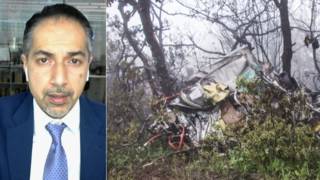
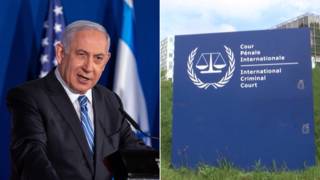
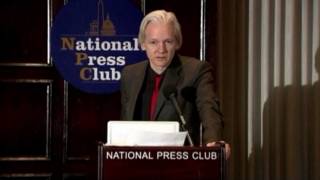
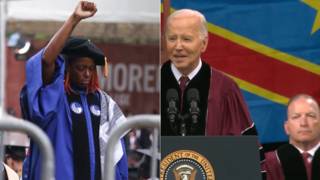
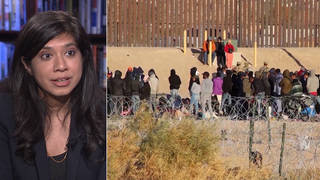




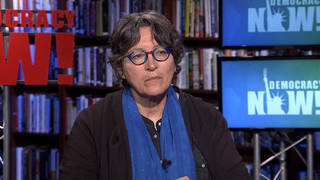
Media Options